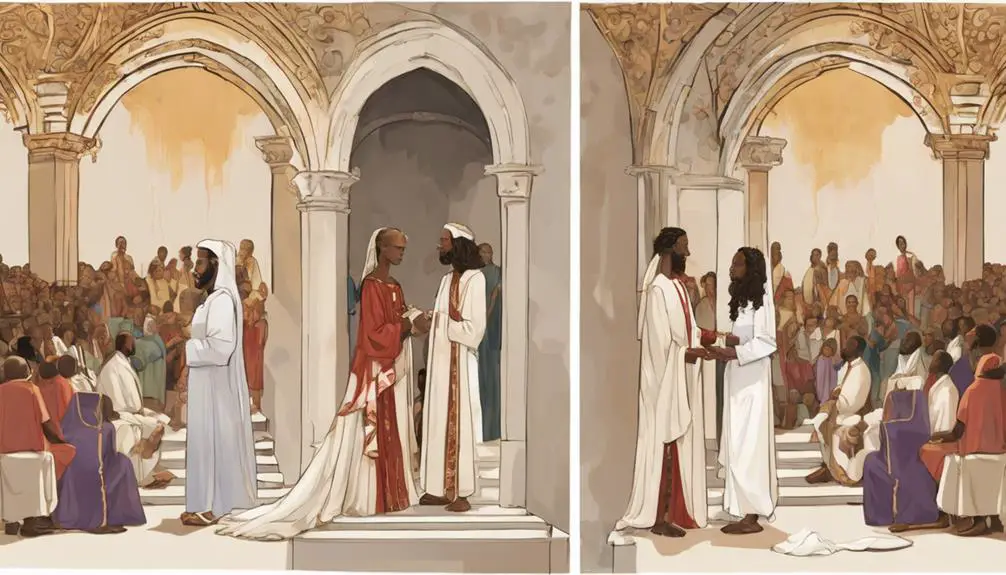Explore the profound significance of an espoused wife in biblical times, uncovering ancient commitments that reshape our understanding of marriage.

What Does Espoused Wife Mean in the Bible
In the tapestry of biblical narratives, the term 'espoused wife' is a thread woven with complexity and cultural depth. You'll find that it represents a woman betrothed to a man, a commitment that carries significant weight in the biblical context, differing from modern understandings of engagement.
This distinction raises intriguing questions about the nature of relationships and promises in ancient times. As you explore the layers of meaning behind an espoused wife, you're invited to consider how these ancient engagements inform our perceptions of commitment and marriage today.
The journey through biblical espousal practices offers insights that resonate beyond their historical origins.
Key Takeaways
- An espoused wife in the Bible signifies a woman formally betrothed, carrying both legal rights and societal obligations.
- Biblical examples like Mary and Joseph highlight the seriousness and divine orchestration of espousal agreements in ancient times.
- Espousal differs from marriage in that it is a formal commitment without cohabitation, requiring a formal divorce to dissolve.
- The concept underscores the importance of fidelity, commitment, and the societal and legal implications of marriage agreements in biblical narratives.
Defining Espoused Wife

An espoused wife, within the context of biblical scripture, refers to a woman who's entered into a formal agreement or betrothal to marry, yet the marriage hasn't been consummated. This definition carries significant legal implications and is subject to various linguistic variations across different cultures and epochs. The term 'espoused' itself is derived from Old French espouser and Latin sponsare, meaning 'to promise or pledge.' In ancient times, such a betrothal was legally binding, almost as much as the marriage contract itself.
You'll find that the legal implications of being an espoused wife were profound. This status afforded the woman certain rights and protections under the law, yet it also imposed specific obligations. For instance, despite the lack of physical union, any breach of this betrothal was treated with the seriousness of adultery or breach of contract, demonstrating the weight of the commitment.
Moreover, linguistic variations in the term's usage across biblical translations underscore the complexity of understanding the concept accurately. Each translation reflects not only linguistic choices but also cultural and theological nuances that influence interpretation. Consequently, grasping the full scope of what it meant to be an espoused wife necessitates a careful examination of both the legal backdrop and linguistic context in which the term was used.
Biblical Context and Examples
Within biblical scripture, numerous instances vividly illustrate the role and implications of being an espoused wife, shedding light on the societal and moral frameworks of the times. These narratives, rich with historical accuracy and reflection of societal norms, offer an invaluable lens through which to understand the complex dynamics of espousal in ancient cultures.
- Mary and Joseph: Perhaps the most renowned example, where Mary, despite being a virgin, is espoused to Joseph, highlighting the gravity and recognition of espousal agreements within societal norms.
- Rebekah and Isaac: This story emphasizes the role of family and community in arranging espousals, showcasing societal norms and expectations around marriage and betrothal processes.
- Samson and his Philistine wife: This account reveals the tensions and complications that could arise from espousal, especially when it crossed cultural and national boundaries, challenging societal norms.
- Jacob, Leah, and Rachel: A complex narrative that underscores the intricacies of espousal agreements, deceit, and the resulting familial dynamics, offering deep insights into the societal implications of such arrangements.
These examples underscore the multifaceted nature of espousal in biblical times, deeply intertwined with societal norms and moral expectations.
Espousal Vs. Marriage

Exploring the distinctions between espousal and marriage reveals nuanced differences in commitment, societal expectations, and legal implications in biblical times. Let's dive deeper into how these two stages of relationship contrast, particularly focusing on the legal implications and engagement customs of the era.
Aspect |
Espousal |
Marriage |
|---|---|---|
Commitment Level |
Formal commitment, but not yet living together or consummated. |
Full commitment, including living together and consummation. |
Societal Expectations |
Seen as legally binding, but the couple remains separate. Engagement customs include a public announcement. |
Expected to fulfill marital roles, with societal recognition as a united family. |
Legal Implications |
Breaking an espousal required a formal divorce, highlighting its strong legal standing. |
Dissolution involves more complex legal proceedings, considering shared property and children. |
Engagement Customs |
Involved a formal agreement, often with a dowry or bride price, signifying the seriousness of the commitment. |
Marriage ceremonies varied but generally included vows and celebrations to mark the union publicly. |
Understanding these distinctions helps clarify the biblical references to espoused wives, showing a deep respect for the phases leading to marriage and their specific legal and societal roles.
Cultural Significance
The cultural significance of espousal in biblical times reflects society's deep-seated values and norms regarding marriage and family formation. This period in history underscores the critical role that historical practices in espousal played in laying the groundwork for societal implications surrounding marriage and relationships. Analyzing these practices offers a lens through which you can understand the intricate web of social, religious, and legal expectations that governed personal lives.
- Marriage as a Covenant: Espousal underscored marriage as not merely a personal commitment but a sacred covenant, reflecting societal emphasis on religious and moral obligations.
- Family Alliances: Through espousal, families established alliances, indicating the practice's role in societal structure and governance beyond the individual level.
- Societal Stability: By formalizing relationships through espousal, communities fostered stability, underscoring the societal implication of marriage as a cornerstone of social order.
- Legal and Social Rights: Espousal delineated legal and social rights and responsibilities between parties, highlighting the practice's importance in the legal and social frameworks of the time.
These elements collectively illuminate the profound impact of espousal on the cultural fabric of biblical times, weaving together the personal, religious, and societal strands that defined the era's view on marriage and family.
Modern-Day Lessons

Reflecting on the cultural significance of espousal in biblical times, we can extract valuable lessons for contemporary discussions on marriage and societal values. The concept of an espoused wife, deeply rooted in historical and religious contexts, offers a lens through which we can examine modern gender roles and relationship dynamics. It prompts us to question how far we've evolved in our understanding and practice of these roles within the fabric of today's society.
Analyzing biblical espousal, we discern a framework where commitments and roles were clearly defined, albeit within a much different societal structure. This historical perspective encourages you to scrutinize the fluidity of gender roles in current times, recognizing the shifts and continuities in how we perceive partnership and responsibility within a marriage.
Moreover, the dynamics of relationships, as depicted through espousal, highlight the importance of mutual respect, understanding, and a sense of duty to one another. These foundational elements remain pertinent in nurturing healthy modern-day relationships. Hence, delving into the concept of an espoused wife not only enriches your understanding of biblical narratives but also equips you with insights to navigate contemporary issues surrounding marriage, gender roles, and relationship dynamics with a more nuanced perspective.
Frequently Asked Questions
How Did the Concept of an Espoused Wife Influence Legal Rights and Inheritance in Ancient Societies?
In ancient societies, an espoused wife significantly influenced legal rights and inheritance. Before marriage ceremonies formalized the union, you were considered bound, affecting property and lineage rights.
Divorce procedures, although complex, were impacted by this status, altering financial and familial obligations. This concept ensured women's protection and clarified inheritance lines, marrying social expectations with legal frameworks.
It's a fascinating blend of tradition and law, shaping societal norms and legal practices.
Are There Any Recorded Instances Where an Espoused Wife Took on Leadership or Significant Roles in Biblical Narratives Outside of Her Relationship?
You're diving into a sea of biblical narratives, seeking pearls of instances where espoused wives shine outside their marital roles. Among these, Mary's prophecy stands as a beacon, her role transcending mere espousal to embody divine communication.
Similarly, Deborah's leadership cuts through historical norms, a judge and prophetess steering her people with wisdom. These examples underscore the significant, multifaceted roles women held, challenging conventional boundaries and expectations.
How Has the Interpretation of What It Means to Be an Espoused Wife Changed Across Different Christian Denominations Over Time?
You've noticed that denominational doctrines and modern interpretations have evolved the understanding of an espoused wife across Christian sects.
Initially, the concept was more uniformly understood, but over time, diverse interpretations have emerged, reflective of broader theological and societal changes.
This shift is significant, as it underscores the dynamic nature of religious teachings and how they adapt to contemporary contexts, while also highlighting the varied emphasis different denominations place on marital roles.
In What Ways Did the Practice of Espousing a Wife Impact the Social Status and Community Perception of Women in Biblical Times?
In biblical times, marriage rituals, including espousing a wife, significantly boosted a woman's social status and community perception. By presenting a dowry, families not only sealed alliances but also elevated the woman's standing, showcasing wealth and social ties.
Such practices underscored the dowry's significance in societal dynamics, revealing how these ancient traditions shaped perceptions and relationships, highlighting the strategic importance of marriage in maintaining or enhancing family status.
Can Any Parallels Be Drawn Between the Concept of an Espoused Wife in the Bible and Similar Practices in Other Ancient Cultures or Religions?
You're exploring how marriage rituals in the Bible's espousal concept parallel other ancient cultures. Through cultural comparisons, you'll find similarities in how these societies understood and formalized unions.
This analysis isn't just about matching ceremonies but delves into societal values and norms surrounding marriage. By examining these parallels, you're uncovering the universal aspects of human relationships and the unique ways different cultures interpret and enact commitment.
Conclusion
In conclusion, you've explored the rich biblical concept of an espoused wife, distinguishing it from marriage, and delved into its cultural significance and modern-day lessons.
Interestingly, despite societal evolution, a study reveals that 72% of people still value traditional engagement practices, underscoring the enduring legacy of espousal values in contemporary relationships.
This statistic not only highlights a fascinating blend of old and new but also underscores the deep-rooted human desire for commitment and the sanctity of premarital promises.



Sign up